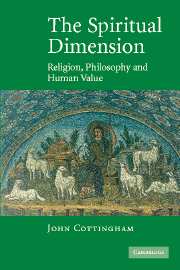Book contents
- Frontmatter
- Contents
- Preface and acknowledgements
- 1 Religion and spirituality: from praxis to belief
- 2 Religion and science: theodicy in an imperfect universe
- 3 Religion and value: the problem of heteronomy
- 4 Religion and self-discovery: the interior journey
- 5 Religion and language: emotion, symbol, and fact
- 6 Religion and the Enlightenment: modernist and postmodernist obstacles
- 7 Religion and the good life: the epistemic and moral resources of spirituality
- 8 Religion and pluralism: which spirituality?
- Bibliography
- Index
2 - Religion and science: theodicy in an imperfect universe
Published online by Cambridge University Press: 24 November 2009
- Frontmatter
- Contents
- Preface and acknowledgements
- 1 Religion and spirituality: from praxis to belief
- 2 Religion and science: theodicy in an imperfect universe
- 3 Religion and value: the problem of heteronomy
- 4 Religion and self-discovery: the interior journey
- 5 Religion and language: emotion, symbol, and fact
- 6 Religion and the Enlightenment: modernist and postmodernist obstacles
- 7 Religion and the good life: the epistemic and moral resources of spirituality
- 8 Religion and pluralism: which spirituality?
- Bibliography
- Index
Summary
Der ganze Erdball kann nicht in größere Not sein als eine Seele. Der christlicher Glaube – so meine ich – ist die Zuflucht in dieser höchsten Not. Wem es, in dieser Not gebeben ist sein Herz su offnen statt es zusammenzuziehen, der nimmt das Heilmittel ins Herz auf. The whole Earth cannot be in greater distress than one soul. Christian faith, so I believe, is refuge in this ultimate distress. Someone to whom it is given in such distress to open his heart instead of contracting it, absorbs the remedy into his heart.
Ludwig Wittgenstein.RELIGION AND THE STANDARDS OF INFERENCE
I argued in Chapter 1 that religious understanding is not attained from a detached, external standpoint, but arrives as the culmination of a programme of praxis. Here, as in many other human endeavours, we learn through involvement and commitment, through immersion in a living tradition, rather than through abstract debate in the seminar room. But although what I have called the ‘primacy of praxis’ may be a feature of the human condition in general, there are still some very important distinctions of degree to be drawn between different areas of inquiry. In the area of religious understanding, as with the understanding of certain literary texts dealing with the emotions (and indeed as with the understanding of our own personal involvements and relationships), I have argued that the adoption of a detached critical stance can often function as an evasion, a way of resisting the vulnerability and receptivity on which true insight depends.
- Type
- Chapter
- Information
- The Spiritual DimensionReligion, Philosophy and Human Value, pp. 18 - 36Publisher: Cambridge University PressPrint publication year: 2005

